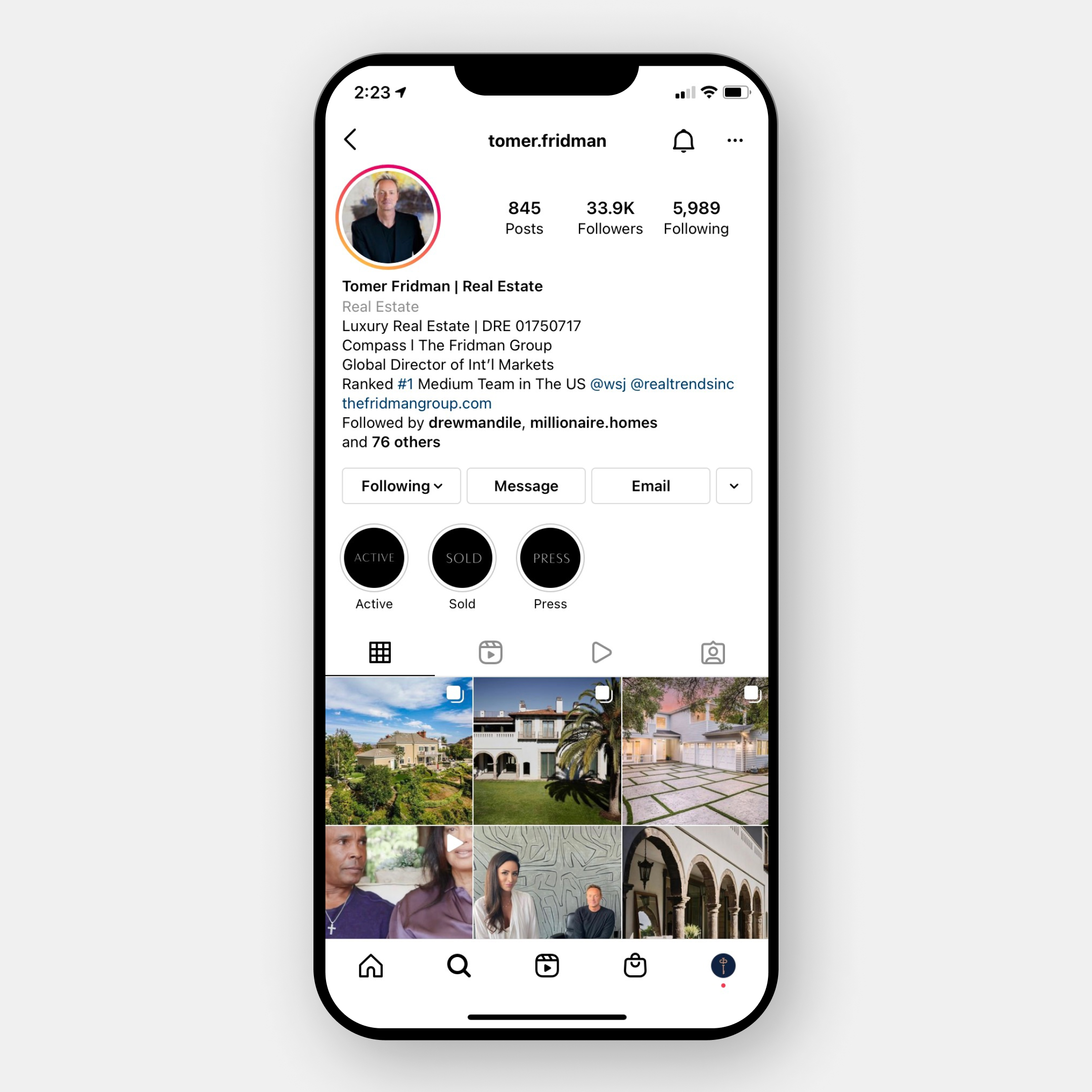Your Real Estate Database: The Most
Important Asset You’ll Ever Build
AUGUST 26, 2021
How to effectively build, manage, and market to your real estate database.
As a real estate agent, you have many different marketing tools at your disposal. One of the most powerful is your database — but it’s important to realize that it’s a long game, not one that will pay immediate dividends.
Here is why a real estate database is so important and how you can effectively build, manage, and market to it.
What is a Real Estate Database?
Your real estate database is simply a list of those you have worked with in the past, are currently working with, or who may be interested in working with you in the future. Your database can be kept in something as simple as an Excel spreadsheet, or it can be entered into a CRM (customer relationship management) system to help facilitate marketing campaigns.
While the number varies depending on the source, some experts recommend having a minimum of 1000 names in your database, as that number can reliably lead to an average of 100 transactions per year regardless of market conditions. Of course, those have to be quality leads who have not already chosen to work with another agent and who are still engaged with your marketing and receptive to furthering the relationship. Even if those in your database have already sold or bought property with you, they can still be valuable people in your database as they are an excellent source of referrals.
How to effectively build, manage, and
market to your real estate database.

Database Marketing Strategies
The Importance of Your Website as a Realtor
As a real estate agent, you have many different marketing tools at your disposal.
One of the most powerful is your database — but it’s important to realize that it’s a
long game, not one that will pay immediate dividends.
Here is why a real estate database is so important and how you can effectively build,
manage, and market to it.
What is a Real Estate Database?
Your real estate database is simply a list of those you have worked with in the past,
are currently working with, or who may be interested in working with you in the future.
Your database can be kept in something as simple as an Excel spreadsheet, or it can be
entered into a CRM (customer relationship management) system to help facilitate marketing
campaigns.
While the number varies depending on the source, some experts recommend having a
minimum of 1000 names in your database, as that number can reliably lead to an average
of 100 transactions per year regardless of market conditions. Of course, those have to be
quality leads who have not already chosen to work with another agent and who are still
engaged with your marketing and receptive to furthering the relationship. Even if those
in your database have already sold or bought property with you, they can still be valuable
people in your database as they are an excellent source of referrals.
Why is Your Database So Important?
Your database is your key to staying in touch with those who may do business with you or who are likely to give you referrals. If you don’t have a way of keeping in touch with them and engaging with them, they will likely forget about you and their business (or referrals) will go elsewhere.
While many agents think they can keep track of those they need to touch base with by retaining their business cards, writing them down in their planner or simply remembering who they are, most are not organized and disciplined enough to do so. They need to rely on a system that involves not only building their database, but also effectively using that database to develop marketing campaigns that can include email newsletters, text campaigns, phone calls, or social media marketing strategies.
Some real estate agents decide to split their databases into two distinct groups: a lead generation group that includes only those who the realtor is attempting to gain as clients, and a sphere of influence group that includes past clients, networking and referral partners, and others who are likely to pass their names on to others who need a real estate agent. While both of these types of databases are useful, most agents find they get more business from their sphere of influence group than their lead generation group — especially if they are not using a professional, unique lead gen system.
What Mistakes Do Agents Make When Building Their Database?
Many agents suffer from “shiny object syndrome” when it comes to building their database. Instead of playing the long game and focusing on ways to slowly build their database with solid leads and close spheres of influence, they jump on the latest and greatest marketing trend and shift their efforts to a strategy they think will make them some quick sales. Unfortunately, a change in algorithm or other occurrences out of your control can easily put an end to the effectiveness of trendy marketing techniques. When you focus on building a solid database, you’ll insulate your business from external changes and reap the benefits a few years down the line when your list pays dividends and your income skyrockets.
Other agents do a good job of building a strong database, but then fail to utilize it by not creating a robust marketing strategy connected to it. Compiling the names is only part of the battle. The more important component is developing a system that consistently engages those in your database to keep them up to date and interested in what you are currently doing. Your system also needs to have “triggers” to let you know when someone in your database is at a stage where they might make the decision to work with you or pass on a referral so you can follow up with a phone call or an in-person meeting.

The Wrong Messaging
Build and Market to Your Database
As a realtor, your database is your best friend. This is your list of past, current, and prospective clients as well as referral sources who can help grow your business. A basic rule of thumb is that an effective database consists of around 1000 names and contact information. Once you’ve built a solid database, you can market to your contacts through regular email newsletters, texts, or personal invitations to events or open houses. The marketing you do to your database should follow the same guidelines as your social media marketing: keep content informational and helpful rather than salesy. This keeps your contacts engaged with your brand and ensures they will continue to pay attention to what you have to say even when they are not actively looking to buy or sell real estate.
Harness the Power of Social Proof
The theory of social proof states that people are likely to conform and copy the actions of those in their peer group or those they view as experts or who are trustworthy. When it comes to real estate marketing, you can take advantage of social proof by featuring testimonials on your site and social media, soliciting online reviews from those you’ve done business with, and by establishing yourself as an authority on the local real estate market with helpful, informative content. When you harness the power of social proof, you essentially have others selling for you and no longer have to hustle or chase leads.

Database Marketing Strategies

The Right Messaging
Why is Your Database So Important?
Your database is your key to staying in touch with those who may do business
with you or who are likely to give you referrals. If you don’t have a way of keeping
in touch with them and engaging with them, they will likely forget about you and
their business (or referrals) will go elsewhere.
While many agents think they can keep track of those they need to touch base
with by retaining their business cards, writing them down in their planner or
simply remembering who they are, most are not organized and disciplined enough
to do so. They need to rely on a system that involves not only building their
database, but also effectively using that database to develop marketing campaigns
that can include email newsletters, text campaigns, phone calls, or social media
marketing strategies.
Some real estate agents decide to split their databases into two distinct groups: a
lead generation group that includes only those who the realtor is attempting to gain
as clients, and a sphere of influence group that includes past clients, networking and
referral partners, and others who are likely to pass their names on to others who
need a real estate agent. While both of these types of databases are useful, most
agents find they get more business from their sphere of influence group than their
lead generation group — especially if they are not using a professional, unique
lead gen system.
What Mistakes Do Agents Make When Building Their Database?
Many agents suffer from “shiny object syndrome” when it comes to building their
database. Instead of playing the long game and focusing on ways to slowly build
their database with solid leads and close spheres of influence, they jump on the
latest and greatest marketing trend and shift their efforts to a strategy they think
will make them some quick sales. Unfortunately, a change in algorithm or other
occurrences out of your control can easily put an end to the effectiveness of trendy
marketing techniques. When you focus on building a solid database, you’ll insulate
your business from external changes and reap the benefits a few years down the
line when your list pays dividends and your income skyrockets.
Other agents do a good job of building a strong database, but then fail to utilize
it by not creating a robust marketing strategy connected to it. Compiling the names
is only part of the battle. The more important component is developing a system that consistently engages those in your database to keep them up to date and interested
in what you are currently doing. Your system also needs to have “triggers” to let
you know when someone in your database is at a stage where they might make the
decision to work with you or pass on a referral so you can follow up with a phone
call or an in-person meeting.
Now that you understand that talking yourself and your accomplishments up on your site is the wrong messaging, let’s take a look at the content that works. Here are some tips on creating messaging that resonates with your target audience:
Content that is helpful. What are the issues your ideal client is dealing with? Are they attempting to buy and sell homes at the same time and need assistance with financing a down payment? Are they struggling to find a home they are interested in due to low inventory? Are they trying to decide if they should relocate or buy a second home now that they are empty-nesters? Identify the pain points in your target market, then address those points through blog posts that you then share on social media and in newsletters that go out to your database.
Content that establishes you as an expert. Those looking for help buying or selling property want to work with the best. To show that you are an expert in your local community and industry, develop content that revolves around neighborhood events, local real estate news, and other industry issues.
Content from experts and past clients. When you use the power of social proof to develop your website content, you let others do the selling for you. Social proof is the phenomenon where others copy the actions of people they see as peers or as trusted individuals. If they see your past clients talking about your high level of customer service in a video testimonial or read reviews from experts in the industry who have worked with you, they will be more likely to choose you as their realtor.
Content that stays ahead of the game. Your ideal client wants to know what’s going on in the industry as soon as possible. They also don’t want to read the same old content on your site that they’ve read on all your competitors’ sites. To address these needs, stay on the cutting edge of the industry and share information your visitors can’t get anywhere else.

Components of an Effective Lead
Generation System


How the Right Messaging Increases Conversions
How Can an Agent Effectively Build and Market to His or Her Database?
The best way to build your list is to be consistent and diligent. When you meet someone new who might be a good fit, work with a new client, or get a solid lead, add them to your database. Then create a system of staying in touch with them via email, text, periodic phone calls, or mailers. Many agents inform those in their database of events going on around town, tell them about changes to interest rates or other market conditions, or just send them a nice note during the holidays or their birthdays. Those in your database should not get a “hard sell.” Instead, they should just receive a light touch regularly so you stay top of mind.
As we mentioned above, a good system will also alert you when you should reach out to someone on your list personally. This “trigger” could be time-based (for example, a trigger could come after a person has been on your list for three or six months). It could also be activity-based, triggering you when one of your database leads visits your landing page, fills out a form, or comments on a social media post.
Most agents don’t have time to create and market to their database on their own, as they are busy networking and buying and selling property. Those who have an in-house marketing team can task them with managing their database, while those with smaller offices will benefit from working with an outside company like Luxury Presence, which can help develop a system to effectively market to their databases.
If you need help with your database creation, management, and marketing, please reach out to our experts for more information!
How Can an Agent Effectively Build and Market to His or Her Database?
The best way to build your list is to be consistent and diligent. When you meet
someone new who might be a good fit, work with a new client, or get a solid lead,
add them to your database. Then create a system of staying in touch with them
via email, text, periodic phone calls, or mailers. Many agents inform those in their
database of events going on around town, tell them about changes to interest
rates or other market conditions, or just send them a nice note during the holidays
or their birthdays. Those in your database should not get a “hard sell.” Instead, they
should just receive a light touch regularly so you stay top of mind.
As we mentioned above, a good system will also alert you when you should reach
out to someone on your list personally. This “trigger” could be time-based
(for example, a trigger could come after a person has been on your list for
three or six months). It could also be activity-based, triggering you when one
of your database leads visits your landing page, fills out a form, or comments on
a social media post.
Most agents don’t have time to create and market to their database on their
own, as they are busy networking and buying and selling property. Those who
have an in-house marketing team can task them with managing their database,
while those with smaller offices will benefit from working with an outside
a company like Luxury Presence, which can help develop a system to effectively
market to their databases.
If you need help with your database creation, management, and marketing,
please reach out to our experts for more information!
LATEST POST
Learn the latest marketing and tech trends from our
marketing gurus and contributing industry experts.

NOVEMBER 30, 2021
HOW TO SET UP A TESTIMONIAL-GENERATION SYSTEM IN YOUR BUSINESS

NOVEMBER 16, 2021
6 WAYS YOU CAN DEMONSTRATE YOUR EXPERTISE WITH SOCIAL MEDIA

FOR THE 2ND YEAR IN A ROW, LUXURY PRESENCE RANKS NO. 598 ON THE 2021 INC. 5000
NOVEMBER 11, 2021
THE POWER OF FORMING STRATEGIC PARTNERSHIPS WITH REFERRAL PARTNERS


